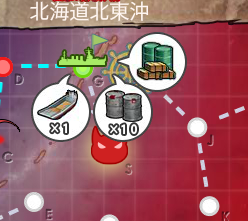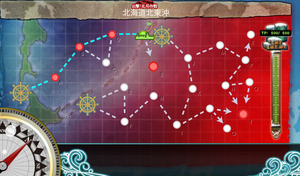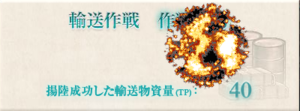- Welcome to the Kancolle Wiki!
- If you have any questions regarding site content, account registration, etc., please visit the KanColle Wiki Discord
Transport Operation
Overview
Transport Operations are an event mechanic that was introduced during the Fall 2015 Event. Unlike the usual map clearing mechanic, completing a Transport Operation doesn't require you to kill the boss.
- The objective of the Transport Operation is to deplete a Transport (TP) gauge.
- The amount of TP that needs to be depleted varies by difficulty.
- The TP Gauge is depleted everytime the fleet reaches a Transport Drop Off point (a node marked with a green flag) then scores at least an A rank victory at the boss.
- Ship girls that are heavily damaged (大破), evacuated using the Fleet Command Facility or sunk are not counted towards gauge depletion.
- You do not need to sink the boss on the final run to clear the gauge.
- These maps are usually completed by a single fleet or a Transport Escort Force.
TP Gauge Depletion
TP gauge reduction is calculated using the following formula: [math]\displaystyle{ \text{TP Drain} = \lfloor \text{Mod}_\text{rank} \times \left( \sum^{\text{All equipment slots}} \text{TP}_\text{equip} + \sum^{\text{All ships in fleet}} \text{TP}_\text{ship} \right) \rfloor }[/math]

- [math]\displaystyle{ \text{Mod}_\text{rank} }[/math] is the rank modifier. It is [math]\displaystyle{ 1.0 }[/math] for S ranks and [math]\displaystyle{ 0.7 }[/math] for A ranks.
- Note that the TP total from ship girls and equipment is rounded down before being multiplied by the rank multiplier and rounded down again.
- [math]\displaystyle{ \text{TP}_\text{equip} }[/math] is the Equipment TP value. See below for details.
- [math]\displaystyle{ \text{TP}_\text{ship} }[/math] is the Ship TP value. See below for details.
Equipment TP
Some equipment provides TP values when used in Transport Operations. Each instance of the equipment shown in the table below contributes towards the TP drain.
Values listed below are the baseline TP reduction values. They may vary from event to event. Please refer to the current event page for notes of any changes.
| Equipment | S-Rank | A-Rank |
|---|---|---|
| 5.0 | 3.5 | |
| 8.0 | 5.6 | |
| 2.0 | 1.4 | |
| 1.0 | 0.7 |
Ship TP
| Ship Type | S-Rank | A-Rank |
|---|---|---|
| Destroyer | 5.0 | 3.5 |
| Light Cruiser | 2.0 | 1.2 |
| Heavy Cruiser | 0.0 | 0.0 |
| Aviation Cruiser | 4.0 | 2.8 |
| Aviation Battleship | 7.0 | 4.9 |
| Seaplane Tender | 9.0 | 6.3 |
| Amphibious Assault Ship | 12.0 | 8.4 |
| Submarine Tender | 7.0 | 4.9 |
| Aircraft Carrying Submarine | 1.0 | 0.7 |
| Training Cruiser | 6.0 | 4.2 |
| Supply Ship | 15.0 | 10.5 |
| Light Carrier | 0.0 | 0.0 |
| Standard Carrier | 0.0 | 0.0 |
| Destroyer Escorts | 0.0 | 0.0 |
Tips
- Stacking only TP depleting equipment can compromise your ability to score an A-rank and result in no depletion at all. On the other hand, focusing too much on offensive capability may result in minimal gauge depletion even on an S-rank. It is ideal to find a balance where you can reliably A-rank the boss while taking as many TP depleting equipment as possible.
- When using a Transport Escort Fleet, the escort fleet should be where all your combat-focused ship girls are assigned. This is because the escort will bear the brunt of all combat.
- Although the daihatsu variants deplete the most TP, careful consideration should go into whether using daihatsu-capable ship girls is appropriate. Locking key ship girls when Anti-Installation is required in subsequent maps can result in disaster.
See Also
| ||

